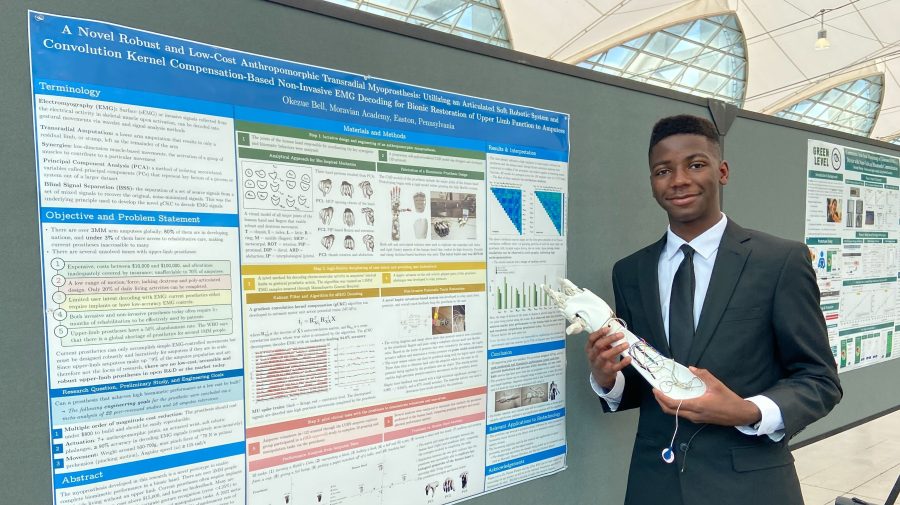For high school STEM students, biotech competition offers a shot at the limelight

This week, 14 high school students presented their research projects at the Bio International Convention in San Diego. Some focused on medical technology, others on environmental solutions.
One student presented a new volatile compound made from beer that he said will benefit honeybee colonies. The students competed for cash prizes of up to $7,500.
Amanda Peacher of “Marketplace Tech” met one 16-year-old winner who traveled from Pennsylvania to showcase his project:
“My name is Okezue Bell. I’m 16 and I’m a junior from Easton, Pennsylvania.
“So I’m here at BioGENEius presenting my research in developing a low-cost prosthetic arm for individuals with below-the-elbow amputations, really developing a prosthetic arm that outperforms current prosthetics on the market, but at a much lower cost.
“I met an amputee friend through a volunteer organization that I work with called Billion Strong. And he had fallen off of his motorcycle and gotten gangrene, which is a sort of infection, and his arm had to be amputated. And so $15,000 and three months later of rehabilitation, he received a prosthetic arm. But ultimately, he said that it was still difficult to use and also painful. So I wanted to develop my own solution.
“Here, the prosthetic hand is actually being controlled by an amputee’s muscle signals, and what they’re essentially doing is that I’m recording those muscles signals via electrodes and then sending them to my prosthetic system. And it’s decoding those signals into these movements that are occurring on the prosthetic, which are opening and closing and also pinching and moving around the fingers as well.
“I think it’s always exciting when the competition is, like, pretty fierce. But I think what’s also nice to see that there’s, like, a sense of camaraderie. Like, right before this, we’re all, like, hanging out at those yoga mats, like listening to music and stuff. So we definitely can have fun with each other, even though we’re all technically in competition with each other.
“So in the gene pool competition, it was essentially like a ‘Shark Tank’ format, except on steroids, where we would only have a minute to present in the first round. Surprisingly, I wasn’t very nervous. The judges asked a lot of questions, which I actually prefer, and it was just overall a really fun experience.
“Yeah, so I’m so glad to have won the gene pool competition. I’m feeling pretty great. It’s just nice to have, like, I don’t know, some sort of validation that I can speak, I guess. I’m excited to have the trophy and the $100. Maybe I can take all of my fellow competitors out to dinner.”
Related links: More insight from Kimberly Adams
We should note that after winning the gene pool competition, Okezue also won the top prize in the overall BioGENEius challenge.
More than 100 medical and tech companies attended that Bio International Convention. And one key conversation among them was the future of mRNA, the technology used to create the COVID-19 vaccines from Moderna and Pfizer. The San Diego Union-Tribune has an article about that in which the reporter highlights how we expand the use of mRNA from those vaccines to curing other types of diseases.
There are a couple of reports from the Pew Research Center that look at diversity in the fields of science, technology, engineering and math, also known as STEM. Pew’s survey of Hispanic adults shows there’s a lot of room for additional representation. Fifty percent of respondents expressed that it would encourage them “a lot” to see more high-achieving people who look like them in STEM.
A similar Pew report from April focuses on Black Americans’ views. Some 44% of Black high school graduates say they were made to feel excited about their abilities in STEM, or at least encouraged to keep taking such classes. And in general, half of Black adults surveyed expressed that the lack of mentorship was a major reason younger people don’t pursue further education in the industry.
The future of this podcast starts with you.
Every day, the “Marketplace Tech” team demystifies the digital economy with stories that explore more than just Big Tech. We’re committed to covering topics that matter to you and the world around us, diving deep into how technology intersects with climate change, inequity, and disinformation.
As part of a nonprofit newsroom, we’re counting on listeners like you to keep this public service paywall-free and available to all.
Support “Marketplace Tech” in any amount today and become a partner in our mission.


















